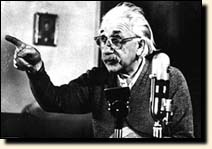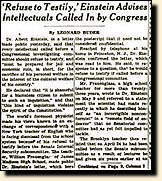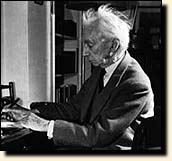"The feeling for what ought and ought not to
be grows and dies like a tree, and no fertilizer of any kind will
do much good. What the individual can do is give a fine example,
and have the courage to firmly uphold ethical convictions in a
society of cynics. I have for a long time tried to conduct myself
this way, with varying success."

| After the Japanese surrendered
under nuclear bombardment, Einstein was often in the public
eye. In May 1946 he became chairman of the newly formed Emergency
Committee of Atomic Scientists, joining their drive for
international and civilian control of nuclear energy. He recorded
fund-raising radio messages for the group, and wrote a widely
read article on their work. Einstein's appeals for nuclear
disarmament had an influence among both scientists and the
general public. He also spoke out in opposition to German
rearmament, defended conscientious objectors against military
service, and criticized the Cold War policies of the United
States. An early and firm supporter of the United Nations,
he was convinced that the solution to international conflict
was world law, world government, and a strong world police
force. "I am opposed to the use of force under any circumstances,
except when confronted by an enemy who pursues the destruction
of life as an end in itself." |
 Want
to buy
Want
to buy
this photo?
 Like many in the 1950s who supported liberal causes, Einstein
was suspected of disloyalty. He publicly
opposed such McCarthyism. Asked how intellectuals should
respond, he declared, "I can only see the revolutionary way
of non-cooperation."
Like many in the 1950s who supported liberal causes, Einstein
was suspected of disloyalty. He publicly
opposed such McCarthyism. Asked how intellectuals should
respond, he declared, "I can only see the revolutionary way
of non-cooperation." |
 Click here for Einstein's voice -- on nuclear weapons and peace
Click here for Einstein's voice -- on nuclear weapons and peace

"Here, then, is the problem which we present
to you, stark and dreadful and inescapable: Shall we put an end
to the human race or shall mankind renounce war? People will not
face this alternative because it is so difficult to abolish war."

|
Although his activity was limited by advancing age and
ill health, Einstein made clear his commitment to civil liberties.
He attacked racial prejudice and supported the black civil
rights movement. He called for a homeland in Palestine for
the Jewish people, in which the rights of Arabs would also
be respected. Meanwhile, he supported the creation of a Jewish
university in the United States (the future Brandeis University).
When the House Committee on Un-American Activities maligned
teachers and other intellectuals, Einstein publicly advised
the people under attack not to cooperate, but to follow the
principle of civil disobedience. He was equally uncompromising
when he refused any association with Germany. He even rejected
honors from his native land -- he could not forgive the murder
of Jews by Germans.
In 1952 Einstein was offered the position of President of
Israel, a chiefly honorific post. Old and sick, but at peace
in his Princeton home and office, he turned down the invitation.
His interest in public affairs, however, continued. In 1955
he joined Bertrand Russell in urging scientists toward mediation
between East and West and limitation of nuclear armament.
Meanwhile he was writing a speech for the anniversary of Israel's
independence. An incomplete draft of the speech was found
at his bedside after he died.
|

Bertrand Russell |

"The abolition of war will demand distasteful
limitations to national sovereignty. But what perhaps impedes
understanding of the situation more than anything else is that
the term mankind feels vague and abstract. People... can scarcely
bring themselves to grasp that they, individually, and those whom
they love are in imminent danger of perishing agonizingly. And
so they hope that perhaps war may be allowed to continue... this
hope is illusory."
|
|

